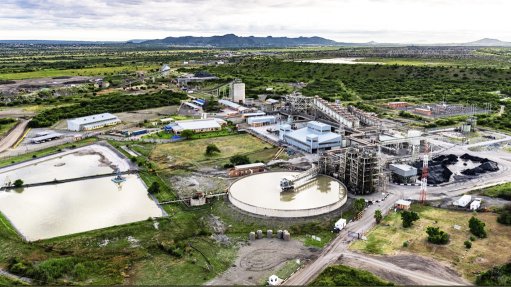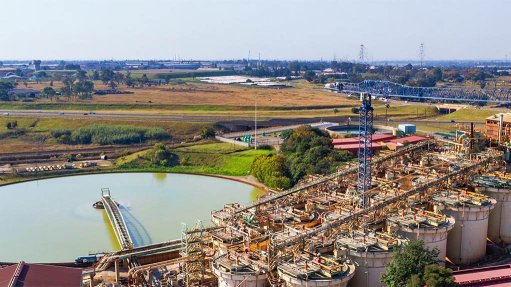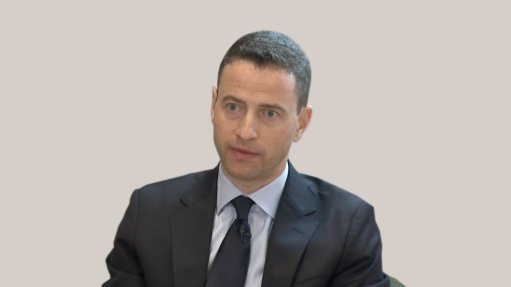PGM-boosted green hydrogen backed by resolute South African govt's commitment

Higher Education & Training DDG Zukile Mvalo’s green hydrogen presentation covered by Mining Weekly’s Martin Creamer. Video: Creamer Media’s Shadwyn Dickinson. Video Editing: Nicholas Boyd.
JOHANNESBURG (miningweekly.com) – The production of green hydrogen, which is most effectively generated when catalysed by platinum group metals (PGMs), has profound economic and social implications, including job creation, skills development, and the fostering of new industries along a multifaceted mining, manufacturing and agricultural value chain.
Encouragingly, the South African government representatives at this week’s Green Hydrogen Roundtable at the Nedbank Corporate and Investment Banking (CIB) head office in Sandton, were able to report that Higher Education, Science and Innovation Minister Dr Blade Nzimande has identified the skills needed for the hydrogen economy and is taking all-embracing steps to accelerate green hydrogen know-how.
Speaking on behalf of the Minister was Higher Education and Training Department deputy director-general Zukile Mvalo, who informed attendees at the event covered by Mining Weekly that “as a government, we're resolutely committed to green hydrogen, particularly in our efforts to catalyse robust economic growth and generate meaningful employment opportunities, all in pursuing a cleaner, more sustainable energy future". (Also watch attached Creamer Media video.)
Mvalo highlighted that the government is acutely aware of the vast opportunities that green hydrogen presents.
As an energy source that can meet South Africa’s net-zero obligations, South Africa is poised to deploy a minimum of 15 GW of electrolysis to produce 500 kilotonnes of green hydrogen a year for use across far more than the often-emphasised transportation, built environment, industrial, and power sectors, and carrying the emission-free energy that PGM-catalysed hydrogen fuel cells can take into several more ecosystems.
“This challenge should be viewed as an opportunity to reimagine our skills development trajectory aimed at sustainable employment creation, a fit for the future, with demand-led skills intervention at the centre,” Mvalo said.
“At the centre, I emphasise it is going to be partnership, partnership and more partnership with the private sector,” he added.
As emphasised by Nedbank CIB head of infrastructure, energy and telecommunications Mike Peo, green electrons generated by sun and wind energy, and the green molecules that green electrons enable, can be the platform on which the South African economy is reindustrialised.
Peo calculated the opportunities that green energy and green hydrogen provide as being almost limitless.
Meanwhile, the international studies that took Mvalo and his team to Australia, Canada, the UK, France, and the European Union are helping South Africa’s Higher Education and Training Department to fill South Africa’s emerging green energy skills gap in a world-competing manner.
“Understanding that this is a nascent industry with no current shortage provides us with an opportunity to look at the skills source of supply,” said Mvalo, who added that chemical companies can lead interventions with on-the-job training and upskilling.
However, overall, hydrogen qualifications are missing in South African institutions and curriculum revision is needed along with training programmes for lecturers and trainers.
“We must promote green hydrogen as an industry of choice for students and workers in declining sectors, and initiatives like this roundtable are critical to helping the country understand the importance of hydrogen,” Mvalo reiterated.
South Africa’s Chemical Industries Education and Training Authority (CHIETA) is leading the way with the establishing of the first centre of specialisation for green hydrogen skills and CHIETA is working on this with South Africa’s mining and transport sector education and training authorities, or Setas, its CEO Yershen Pillay announced at the Nedbank event.
South Africa has 26 universities, 50 technical and vocational education and training, or TVET, colleges and 21 Setas.
On the resources side, South Africa has superior sun for solar power, prime wind for wind power, ample land for renewable energy generation, a lengthy coastline for access to water, inland grey water from which green hydrogen can be sourced and the world's largest endowment of PGMs, which are the most efficient catalysts in electrolyers that split water into hydrogen and oxygen and which are also the key catalysts in hydrogen fuel cells that turn the green hydrogen back into green electricity for a multiplicity of uses, emissions free.
Article Enquiry
Email Article
Save Article
Feedback
To advertise email advertising@creamermedia.co.za or click here
Press Office
Announcements
What's On
Subscribe to improve your user experience...
Option 1 (equivalent of R125 a month):
Receive a weekly copy of Creamer Media's Engineering News & Mining Weekly magazine
(print copy for those in South Africa and e-magazine for those outside of South Africa)
Receive daily email newsletters
Access to full search results
Access archive of magazine back copies
Access to Projects in Progress
Access to ONE Research Report of your choice in PDF format
Option 2 (equivalent of R375 a month):
All benefits from Option 1
PLUS
Access to Creamer Media's Research Channel Africa for ALL Research Reports, in PDF format, on various industrial and mining sectors
including Electricity; Water; Energy Transition; Hydrogen; Roads, Rail and Ports; Coal; Gold; Platinum; Battery Metals; etc.
Already a subscriber?
Forgotten your password?
Receive weekly copy of Creamer Media's Engineering News & Mining Weekly magazine (print copy for those in South Africa and e-magazine for those outside of South Africa)
➕
Recieve daily email newsletters
➕
Access to full search results
➕
Access archive of magazine back copies
➕
Access to Projects in Progress
➕
Access to ONE Research Report of your choice in PDF format
RESEARCH CHANNEL AFRICA
R4500 (equivalent of R375 a month)
SUBSCRIBEAll benefits from Option 1
➕
Access to Creamer Media's Research Channel Africa for ALL Research Reports on various industrial and mining sectors, in PDF format, including on:
Electricity
➕
Water
➕
Energy Transition
➕
Hydrogen
➕
Roads, Rail and Ports
➕
Coal
➕
Gold
➕
Platinum
➕
Battery Metals
➕
etc.
Receive all benefits from Option 1 or Option 2 delivered to numerous people at your company
➕
Multiple User names and Passwords for simultaneous log-ins
➕
Intranet integration access to all in your organisation



















